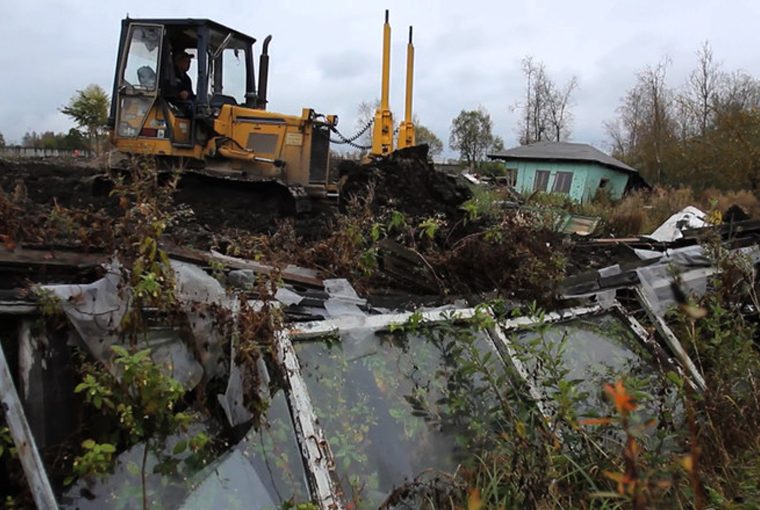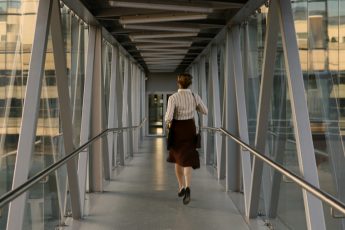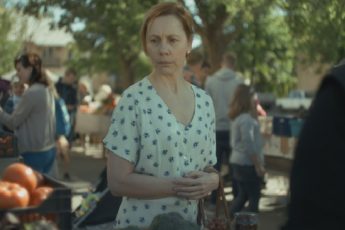The Search for Identity
Aljona Surzhikova’s Not My Land (Suur-Sõjamäe, 2015)
Vol. 70 (December 2016) by Isabelle de Pommereau
The camera slowly zooms in on Galina Polityko’s wrinkled face. Sitting outside her dacha on a green swathe of land near the Lennart Meri airport in Tallinn, the retired engineer reminisces the good old times in Soviet Estonia, where the Belarus native worked for the war-factory Dvigatel. “Only the best graduates were assigned here, we thought ourselves lucky to be here,” she says. But then came 1991, the end of Communism. “There was a plant with 5000 employees and all of a sudden everything was gone. This was really hard to understand.”
And now? A plane flying low muffles Polityko’s voice. After Estonia became independent, the land changed owners. It now belongs to the airport, and soon her dacha is going to be destroyed as a result of airport expansion plans. Polityko shows her passport. It is grey and has “World Citizen” written on it. She has no nationality, really. “I’m not Russian, I’m not Estonian,” she says. “I have nothing to prove that I’ve lived here for 47 years, that Estonia is my land.”
The weight of history
History weighs heavily on Estonia. It’s left the tiny country with an existential anxiety over its language and identity. By the time the Red Army invaded the country in 1940 as a result of the Molotov-Ribbentrop pact between Hitler and Stalin, Estonia, along with its sisters Latvia and Lithuania, had only been independent for two decades, from 1920 on. Before that it’d been occupied, by Denmark, Sweden, Germany, Russia. And now for the next five decades Estonia would bounce from one dictatorship to the other: in 1941, Nazi Germany kicked the Soviets out. In 1944, the Soviet Army pushed the German Nazis out, and Estonia was incorporated into the Soviet Union. Deportations and the forced Russification marked the Soviet occupation, which ended in 1991. When the last Russian troops left in 1994, Estonia turned to the West, a way to stay away from Russia, the dreaded neighbor. It joined the EU, NATO, and the Eurozone with stubborn resoluteness and rebuilt itself as one of the world’s first wired societies.
In the eyes of some, war, occupation and Stalinist terror has led Estonia to glorify independence. Estonia’s taking a hard line towards its Russian speakers is also a concern. In Soviet times they had been catapulted here from the USSR’s four corners – from Uzbekistan to Georgia and Ukraine – to work in Tallinn’s shipyard, Narva’s textile and the northeast’s new oil shale plants. After the collapse of the Soviet regime, 450,000 Russian were living in Estonia, constituting roughly a third of the population, up from just 10 percent before 1944. Overnight their status changed, from respected Soviet citizens to resented “occupiers.” Only those who had lived in Estonia before 1944 became Estonian citizens; the others had to apply for citizenship and pass an Estonian language exam. Today, roughly 182,000 Russian speakers are Estonian citizens, another 97,000 are Russian citizens, while some 100,000, like Arkadi Kseniya, hold a grey passport, meaning that they are stateless. They tend to form Estonia’s underclass.
The two communities live peacefully together, albeit in parallel worlds. But simmering tensions occasionally fuse. They did in 2007 when the removal of a Soviet war monument from central Tallinn to the Military Cemetery outside the capital led to alarming rioting among Russian speakers; they did, too, after Russia’s annexation of Crimea in 2014. Estonians are impressive in their ability to rally together to celebrate their culture – their independence, language, identity – as they do with Laulupidu, their huge singing festival. But for long the voices of Russian speakers were barely heard. There was little interest, and little talent.
Aljona Surzhikova’s Not My Land represents change. Surzhikova was named Best Young Filmmaker of the Year in 2013 by Estonia’s Cultural Endowment for the Arts, a first for a Russian speaker. Not My Land “opened cultural borders in the society,” the jury concluded. Raivo Vetik, a social scientist at Tallinn University who specializes on the relationship between Russian speakers and ethnic Estonians, says Surzhikova has managed to give credibility to the concerns of Russian speakers – their resentment and sense of alienation. “What those people say is very human,” Vetik says. “You see that they suffer, but they are not guilty.” And that, in Estonia, is a breakthrough. There is a “sort of genetic code in us Estonians that doesn’t let us forgive, and Russian speakers have coded this lost empire feeling,” says Marje Jurtshenko, head of acquisition at Estonian Public Broadcasting (ETV), who has worked with Aljona Surzhikova since the mid-2000s. “We think we were occupied, and it not an easy time, but looking at those people in Not My Land you start to understand they don’t have an easy time either.”
A new new elite of Estonian Russians
Surzhikova is part of a new guard of Estonian Russian speakers who are helping fill an identity vacuum among Estonia’s Russian speakers. Brought up in Russian speaking worlds but educated at Estonian universities, they have developed their own voice. And their voice differs from the two main political narratives prevailing in Estonia: Putin’s narrative that glorifies Russia’s imperial past, and Estonia’s narrative of European nation states. Their common thread is to bring questions of identity among Russian speakers closer to the mainstream of Estonian society. What does it mean to be a Russian speaker in today’s Estonia, 25 years after the Soviet regime collapsed? How do Russian speakers feel about Russia, about Estonia? What defines Estonian-ness?
Historian and novelist Andrei Hvostov, who was born to a Siberian father and an Estonian mother, tackled some of these questions in Passion of Sillamäe, his hugely successful tale of growing up in – and hating – the closed, secret Soviet military town of Sillamäe, in Estonia’s northeast, close to the Russian border. The book, written in Russian but translated into Estonian, German and English, was an effort “to make the Russians understand the Estonians and the other way round,” Hvostov said. In the town of his childhood, in Soviet times a high security base where uranium was enriched and plans for the nuclear bomb concocted, Hvostov’s father wanted his son to grow up as a Soviet citizen. But Hvostov rebelled, partly by talking to his father in bad Russian, or refusing to join the Pioneers, the Soviet children and youth organization. He became part of an ostracized minority of Estonian speakers in the largely Soviet-dominated region, an outcast or a “bastard”, as he said, fitting neither into the Russian world nor the ‘real Estonia’ where his grandmother lived. Today Hvostov hates being labelled a member of Estonia’s “Russian minority.” Russian speakers no longer form a homogeneous group. They are Russian Estonians, part of a multi-faceted group with many viewpoints.
And there is Darja Saar, editor of ETV+, Estonia’s first Russian-speaking public television station, who is a civil society activist and journalist. “For too long, Russians were consumers, not actors in society,” says Saar. The idea for ETV+ came after the Bronze Night, when officials saw they had to do more to reach out to Russian speakers. But it wasn’t until the Ukrainian crisis, in 2015, that the government made it happen. “We want to make Russians visible, make them participate in discussions.” Saar has what it takes: he is a former member of the Soviet gymnastics Olympic team in Kazakhstan who moved to Narva, the economat at the Russian border, at 11. She learned Estonian, got her MA in public administration at Tallinn University before becoming an entrepreneur with a foot in the Russian- and Estonian-speaking worlds. At Eesti Energii, the Estonian state energy company close to Narva, she created ENTRUM, a non-profit foundation that matches young people – mostly Russian speakers – with mentors so they can get into the job market more easily.
One of them
Aljona Surzhikova brings Estonia a unique access to Russian speakers and a quintessentially Slavic openness and emotional voice so that “even if the topic is something simple, it transmits honesty,” says Marje Jurtshenko of Estonia’s Public Broadcasting. “Slavic people are very open, but you have to talk their own language,” Surzhikova says. “If you open up in their language, they open up.” She grew up in Lasnamäe, Estonia’s biggest Russian enclave, a huge, bleak, sprawling Soviet-era housing community of 130,000 on the outskirts of Tallinn. Her father, an engineer from Odessa, Ukraine, came to Tallinn to work in the shipyard industry. And there, if people have tended to throw their vote around Edgar Savisaar, Tallinn’s controversial former mayor, it was because – or in spite of – his known ties with Moscow. “They feel Savisaar is one of them,” says Surzhikova. “He (Savisaar) had a “Soviet way of thinking” and knew how to deal with local Russians, how to use money to get votes.”
Surzhikova was 15 when her father passed the language test allowing him to become an Estonian citizen. That’s how she, too, automatically got the citizenship. But Surzhikova’s mother, who was born in Uzbekistan, never managed to pass the test. “Mother is sad: she always thinks,’I gave my best years for this country, I gave three children to this country, and I am an alien now,” says Surzhikova says. “’Alien’ is not a good name. Alien means being from another world.”
“But I can understand Estonians: They just want to protect their language”, she says. “We are so different, we have very different mentalities: the Russians are from a big nation, we think ours is the best. Estonia is a small country, culture, they had a very complicated history.”
A foot in both worlds
Unlike many of her Lasnamäe friends, Surzhikova made it into Tallinn University’s Baltic Film and Media School, becoming the first Russian speaker to graduate in TV directing (later she also graduated from the St. Petersburg State University of Film and Television). The jump into an all Estonian-society was brutal. “I never wanted my children to go through what I went through,” she says. Today, Surzhikova, her husband, the film producer Sergei Trofimov, and their three young children live in Käru, a hamlet of 700, one hour away from Tallinn in the Estonian countryside. The move three years ago had made waves. “When we arrived, the Estonian kids said, ‘the Russians are coming!’ Surzhikova. ‘They are afraid of us.’” She understands. After all, “we are big and they are small.” She responded by inviting the Estonian kids to play with her kids, being the bridge maker she is in her film. Now her kids speak Estonian, and her neighbor’s kids speak Russian. Her life, and her work result from this double identity, her commitment to Estonia and her attachment to Russian culture. For her, an anchor is the Russian Orthodox parish in Tallinn.
Questions of identity have been central to Aljona Surzhikova’s work early on. For one of her first projects at the Baltic Film and Media School she dealt with kindergarten life in Tallinn by profiling a Russian kindergarten and an Estonian one. At 21 she created and presented Multicon, a TV-show for young people aired in Russian and Estonian. Until 2011 she made documentaries in Russian for “Estonian Stories”, a Public Broadcasting series on facts of life in Estonia. This gave her visibility, while making the Russian perspective broader on public television.
A breakthrough came with Bachelor and Volga (Poissmees ja Volga, 2014), a documentary about a high school teacher set in the Russian enclave of Narva where she delves into the issue of language policies for Russian speakers. Forty-something-year-old Misha is a regular guy who is passionate about old Soviet Volga cars and is looking for the love of his life. He is also a history teacher in a city where 98 percent of the children still speak Russian at home and residents tend to be resentful of Tallinn politicians. The camera zooms in on Misha. Civil rights is the topic of the day. What does civil rights mean? Misha addresses the class, in Russian. Then, he writes “civil rights” on the blackboard, in Estonian. That’s one of the tricks Russian-speaking teachers use to circumvent the requirements that public school teachers teach mostly in Estonian. Language inspectors zigzag the country to check on teachers’ Estonian levels; not speaking Estonian well enough may get teachers fired. “Teachers hate those language inspections, they say its like the Gestapo” Surzhikova, says.
From the bank of the Narva River one can see the Russian flag waving from Ivangorod, a medieval fortress across the river 84 miles from St. Petersburg. In Soviet times Russification in Narva was complete. The USSR made Narva one of its industrial hearts, with the Kreenholm textile factory employing up to 13,000 people and new oil shale plants drawing thousands of workers into the region. But Kreenholm closed after independence, and the area never fully recovered. For decades, Narva was a forgotten outpost, a place of drugs and despair that Estonian filmmaker Sulev Keedusin has portrayed in The Russians on Crow Island (Varesesaare venelased, 2012).
With Bachelor and Volga or Not My Land, Aljona Surzhikova explores the long-neglected topic of Russian-speaking identity. But her work is also a young Russian woman’s search for her own identity. “Those people have no roots: they are not Estonian and not Russians,” Surzhikova says of the retired Dvigatel workers she portrays in Not My Land. “That’s why I keep my roots: I don’t want to have children who cannot speak with their grand parents.”
Why did she do the film? “I did the film for my children. They always ask why we Russians are here,” she says. “Or I did it for myself, to understand. I did it because I couldn’t not do it.”




Leave a Comment